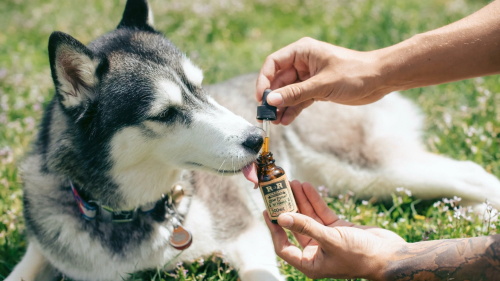Herbal Therapies for Pets: A Safe and Effective Treatment

In recent years, many pet owners have begun trying natural remedies to maintain their pets' health. Herbal remedies have a long history of use in human medicine and now have a place in veterinary care. When used properly, these natural remedies can provide safe and effective solutions for a variety of common pet ailments. However, caution is crucial when using herbal remedies, and always consult your veterinarian before introducing any new treatment.
Understanding Herbal Therapies for Pets
Herbal therapy refers to the use of plant-based substances to promote health and treat illness. In veterinary practice, herbal remedies are often used as a complementary treatment to conventional medicine. They can promote the body's natural healing process, relieve symptoms, and improve overall health.
Before incorporating herbal remedies into your pet's care regimen, it's important to understand your pet's specific needs and sensitivities. Not all herbs are safe for all animals, and dosages vary depending on breed, size, and health status.
Common Herbs and Their Benefits
1. Turmeric (Curcuma longa)
Turmeric is known for its anti-inflammatory and antioxidant properties, primarily due to its active compound, curcumin. For pets, turmeric can offer the following benefits:
Joint Health: It helps reduce inflammation and pain associated with arthritis and other joint problems.
Digestive Support: Turmeric can aid digestion and relieve indigestion symptoms.
Immune System Boost: Its antioxidant properties help boost the immune system.
How to Use: Turmeric can be added to your pet's food in small amounts. It's often mixed with black pepper to enhance absorption. Consult your veterinarian for the appropriate dosage.
2. Chamomile (Matricaria chamomilla)
Chamomile is a mild herb known for its calming properties. It can be used for:
Anxiety Relief: It helps soothe nervous or anxious pets.
Digestive Aid: It relieves minor digestive issues such as gas or bloating.
Skin Irritation: Chamomile can be applied topically to reduce inflammation and promote healing.
How to Use: Chamomile can be drunk as a tea or diluted for topical application. Ensure it's safe for your pet before use.
3. Milk Thistle (Silybum marianum)
Milk thistle is primarily known for its liver-protecting properties. It contains silymarin, an antioxidant that may:
Liver detoxification: Supports the liver in detoxifying harmful substances.
Liver protection: Helps protect liver cells from damage.
Medication support: Benefits pets taking long-term medications that may affect liver function.
How to Use: Milk thistle is available in a variety of dosage forms, including capsules and tinctures. Consult your veterinarian for appropriate dosage.
4. Ginger (Zingiber officinale)
Ginger is widely used to treat nausea and digestive issues. For pets, it may:
Relieve motion sickness: Helps reduce symptoms of nausea and vomiting.
Improve digestion: Stimulates appetite and aids digestion.
Anti-inflammatory effects: Relieves discomfort caused by inflammation.
How to Use: Ginger can be given in small amounts, usually in the form of powder or fresh ginger root. Ensure it is safe for your pet and consult your veterinarian to determine the dosage.

5. Valerian Root (Valeriana officinalis)
Valerian root is known for its calming properties and can be used for:
Anxiety Relief: Helps calm nervous or overactive pets.
Sleep Aid: Promotes restful sleep in insomniac pets.
How to Use: Valerian root should be used with caution and under veterinary supervision, as its effects may vary between animals.
6. Dandelion (Taraxacum officinale)
Dandelion is more than just a common weed; it's a powerful herb with numerous health benefits:
Liver and Kidney Support: Acts as a diuretic and supports detoxification.
Digestive Aid: Stimulates appetite and supports digestion.
Nutrient-Rich: Contains vitamins A, C, and K, as well as minerals such as iron and calcium.
How to Use: Dandelion can be used in tea or added to food. Make sure the dandelion is sourced from a pesticide-free area.
7. Echinacea (Echinacea purpurea)
Echinacea is widely recognized for its immune-boosting properties:
Immune System Support: Stimulates white blood cell production.
Prevents Colds and Infections: Helps prevent colds and infections and reduce their severity.
How to Use: Echinacea is available in a variety of dosage forms, including tinctures and capsules. Consult your veterinarian for appropriate dosage.
8. Aloe Vera (Aloe barbadensis miller)
Aloe vera is widely used for its soothing properties:
Skin Healing: Helps heal minor burns, cuts, and skin irritations.
Digestive Aid: When used properly, it can soothe the digestive tract.
How to Use: Aloe vera gel can be used topically. If considering internal use, ensure it is pet-safe and consult your veterinarian.
Safety Considerations
While herbal remedies offer many benefits, safety is paramount. Here are some guidelines for ensuring safe use:
Consult Your Veterinarian: Always discuss any new herbal remedies with your veterinarian before introducing them.
Species-Specific Dosages: Doses can vary significantly between species; ensure you're using the correct dosage for your pet.
Quality Products: Use high-quality, pet-safe herbal products that avoid contaminants and additives.
Monitor for Side Effects: Watch for any adverse reactions, such as vomiting, diarrhea, or lethargy, and discontinue use if necessary.
Avoid Toxic Herbs: Some herbs are toxic to pets. Never use herbs like garlic, onions, or certain essential oils without veterinary guidance.
Incorporate Herbal Therapies into Your Pet's Routine
Incorporating herbal remedies into your pet's daily care can support their overall health. However, always proceed with caution and under the guidance of a professional to ensure safety and effectiveness.
1. Choose High-Quality Herbal Products
Choose herbal products formulated specifically for pets. These products are tailored to meet the unique needs of animals and are generally free of harmful additives. Ensure the product is from a reputable manufacturer and has been quality-tested. Always check the ingredient list for any potential allergens or substances that may be harmful to your pet.

2. Start with a Low Dosage
Introduce herbal remedies gradually, starting with a dose lower than the recommended dose. This method allows you to monitor your pet for any adverse reactions. If your pet exhibits symptoms of discomfort, such as vomiting, diarrhea, or lethargy, discontinue use and consult a veterinarian. It's important to note that herbal remedies can take time to work, so patience is key.
3. Monitor Your Pet's Response
After starting herbal remedies, closely monitor your pet's behavior and health. Watch for any changes in appetite, energy levels, or overall demeanor. Regular monitoring helps ensure that the herbal remedy is beneficial and not causing any harm.
4. Maintain Open Communication with Your Veterinarian
Regularly update your veterinarian on your pet's progress with herbal remedies. If necessary, they can provide guidance on adjusting the dosage or switching medications. Open communication ensures your pet receives the best care and that any potential issues are addressed promptly.
5. Avoid Self-Diagnosis and Treatment
While it may be tempting to self-diagnose and treat your pet's ailments with herbal remedies, it's important to avoid this. Misdiagnosis can lead to ineffective or even harmful treatments. Always consult a veterinarian before starting any new treatment.
6. Understand the Herbal Therapies
Educate yourself about the herbal remedies you're considering for your pet. Learn about their benefits, potential side effects, and any contraindications. Reliable sources of information include veterinary herbalists, reputable pet health websites, and academic literature.
8. Integrate herbal remedies with conventional care
Herbal remedies can complement traditional veterinary treatments but should not replace them unless recommended by a veterinarian. A comprehensive approach that combines the strengths of both can provide comprehensive care for your pet.
9. Use caution when purchasing over-the-counter products
Over-the-counter herbal products are not specifically formulated for pets and may contain ingredients that are harmful to animals. Avoid using such products unless approved by a veterinarian. Always read the label carefully and consult a professional before use.
10. Stay up to date on the latest research
The field of veterinary herbal medicine is constantly evolving. Stay up to date on the latest research and developments to make informed decisions about your pet's care. Attend conferences, read scientific journals, and engage with professional organizations dedicated to veterinary herbal medicine.
Herbal remedies can be a valuable addition to your pet's health regimen, offering natural treatments for a variety of ailments. However, herbal remedies should be used with caution and under the guidance of a qualified veterinarian. Understanding the benefits and risks of herbal remedies will help you make informed decisions that can improve your pet's health.
Remember, while herbal remedies can promote health, they are not a replacement for traditional veterinary care. Always consult your veterinarian before starting any new treatment to ensure it is safe and appropriate for your pet's specific needs.
Recommended for you



